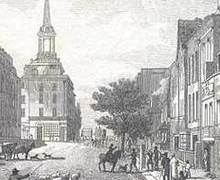History
Overview
At Elizabeth Garrett Anderson, we aim to inspire a life-long love of history by promoting curiosity and wonder about the past. Students follow a spiral curriculum in which knowledge and skills are built upon across the key stages. Learning is structured through a series of enquiries spanning from late antiquity through to the 21st century, allowing students to build a ‘big picture’ of the past to contextualise their studies. We believe that to do justice to history, a broad range of cultures and perspectives should be taught, and our curriculum therefore includes diverse histories and women’s history from the start. The department places a strong focus on historical thinking; students are taught to engage critically with evidence, to analyse the significance of historical events and to evaluate the extent of change over time. They are introduced to different historical interpretations and have the chance to explore how and why historians disagree about the past. These historical skills are developed from the start of Key Stage 3, allowing for a smooth transition to Key Stage 4 and beyond.
Course Content
History Curriculum
Key Stage 3
In Year 7, students are introduced to key historical concepts and skills through a study of Anglo-Saxon England. They then move on to look at the Norman Conquest, medieval kingship, the Black Death, and the Reformation.
In Year 8, students study the Black Tudors, the witchcraze of the 16th and 17th centuries, the development of modern Britain, Africa before the slave trade, the transatlantic slave trade, the Industrial Revolution, and life in Islington in the 19th and 20th centuries.
In Year 9, students study World War One, the Black British Civil Rights movement, the causes of WWII, the Holocaust, and the Cold War.
Ways for parents to support learning
Key Stage 4
History is a consistently popular choice at Key Stage 4, with strong results at GCSE. Our curriculum follows the Edexcel syllabus and aims to consolidate the learning, knowledge and skills that students have gained at KS3.
Students begin their course studying Paper 1: Medicine Through Time. In this unit, students explore change and continuity in medicine in Britain between c.1250 and the present day, learn about the key figures, events and developments involved, as well as completing a case study on the British Sector of the Western Front between 1914 and 1918. They gain insight into the development of science over time, from being intertwined with the medieval church, to undergoing a ‘revolution’ as a result of Enlightenment thinking, and to transforming Britain into its modern state.
Paper 2 covers Elizabethan England (1558 - 1603) and Superpower Relations and the Cold War (1941 - 1991). Elizabethan England encourages students to explore the development of key periods in British history: the Reformation, the Spanish Armada, and the early days of Britain’s nascent empire. Superpower Relations and the Cold War allows students to develop their awareness as citizens by evaluating a range of political and economic systems including communism, capitalism, democracy and dictatorship. They also explore the concept of a ‘superpower’ and the changing basis of power in a new nuclear age. The unit provides key background understanding of modern geo-politics; we draw links between the Cold War and the current war between Russia and Ukraine.
Paper 3 focuses on Weimar and Nazi Germany and gives students the chance to develop their historical interpretation and source analysis skills. We explore how and why historical interpretations change over time, and consider how the nature, origin and purpose of primary sources affects their utility. The paper also enables students to develop essential knowledge, including features of political extremism and the reasons for its growth, and the ways in which democracy can be undermined during periods of crisis. Students will build on their knowledge of the modern world from Key Stage 3, and examine the ways in which Hitler and the Nazis controlled the German population. The unit also contains a crucial analysis of the rise of anti-Semitism across Europe and its culmination in the Holocaust.
Recommended Text Books
At GCSE, recommended textbooks include:
Edexcel GCSE (9-1) History Early Elizabethan England, 1558–1588 Publisher: Pearson
Edexcel GCSE (9-1) History: Superpower relations and the Cold War, 1941–91 Publisher: Pearson
Edexcel GCSE (9-1) History Weimar and Nazi Germany, 1918-1939 Publisher: Pearson
Edexcel GCSE (9-1) History Medicine Through Time, C1250-Present Publisher: Pearson
Useful Websites
http://www.studyhistory.co.uk/
http://www.bbc.co.uk/schools/gcsebitesize/history/shp/
http://www.medicinethroughtime.co.uk/gcsemedicine.htm
http://www.spartacus.schoolnet.co.uk/historywebsites.htm
http://www.nationalarchives.gov.uk/education/
http://www.schoolhistory.co.uk/
http://www.historyonthenet.com/
http://www.edexcel.com/quals/gcse/gcse09/history/b/Pages/default.aspx
Contact
Please contact the Head of Humanities, admin@egas.islington.sch.uk, if you would like more information about the course.



